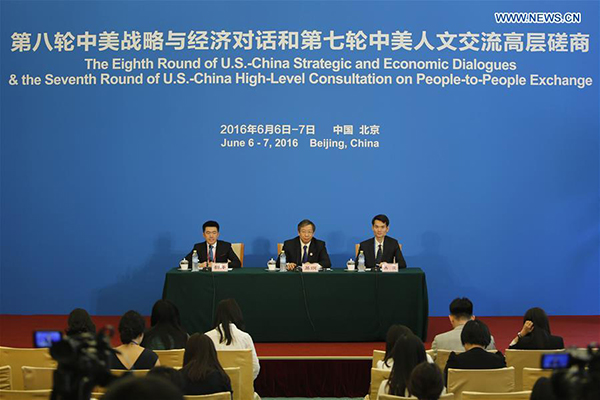 |
|
Yi Gang (C), vice governor of the People's Bank of China, attends a press conference during the eighth round of China-US Strategic and Economic Dialogues and the seventh round of China-US High-Level Consultation on People-to-People Exchange, in Beijing, June 7, 2016. [Photo/Xinhua] |
BEIJING - China will grant the United States a quota of 250 billion yuan ($38 billion) under the country's Renminbi Qualified Foreign Institutional Investor (RQFII) program, an official with the central bank said Tuesday.
"China values the cooperation with the US, and both sides will jointly promote renminbi businesses in North America," Yi Gang, vice governor of the People's Bank of China, told press at the China-US Strategic and Economic Dialogues on Tuesday.
The RQFII mechanism was launched in December 2011 to widen investment channels for overseas renminbi funds on the Chinese mainland, allowing those that qualify to invest in China's securities market within a permitted quota. It aims partly to increase the international use of renminbi.
Yi said China was considering appointing qualified foreign institutions as settlement institutions and bond underwriters, and is simplifying the approval procedures for its RQFII program.
The new quota will expand the mechanism by about 50 percent. The combined RQFII quota stood at 501.77 billion yuan at the end of last month.
By the end of May, China had approved RQFII quotas to 165 institutions from 10 countries and regions.
Chinese Vice Premier Wang Yang told a news briefing Tuesday that China and the US welcomed continuous cooperation between financial platforms and both sides would strive to connect their financial markets and products.
Financial regulators from both countries are willing to enhance cooperation in information sharing and cross-border law enforcement, Wang said.
The vice premier added that the two sides had agreed to promote exchanges to address money laundering, the financing of terrorism and counterfeit bank notes.
The two sides reiterated that the International Monetary Fund (IMF) should increase quotas, the voting power and maximum financial commitment, for emerging markets and developing nations.
